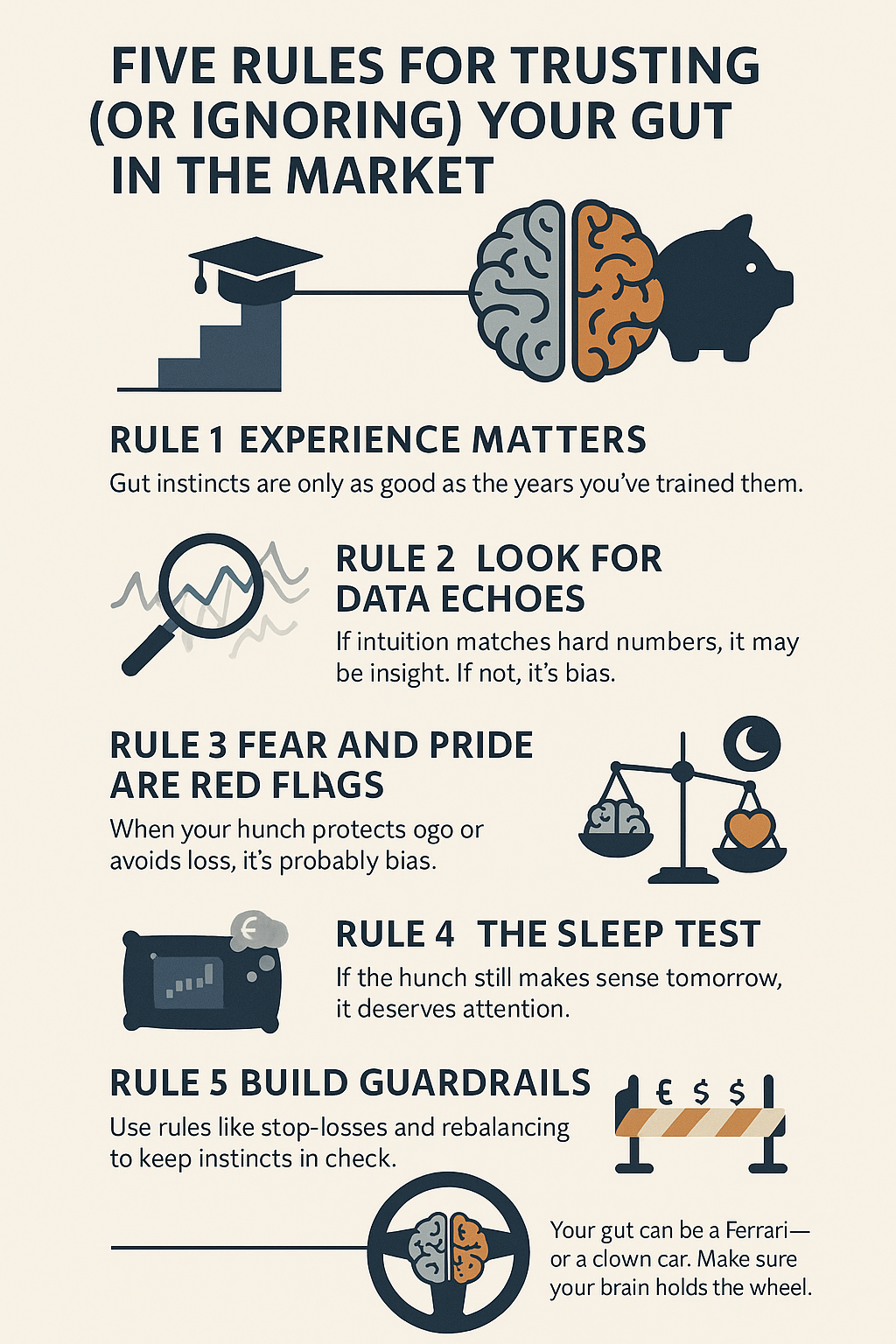
ChatGPT:
Why instinct alone won’t make you rich—and how to know when it’s worth listening.
The Myth (and Reality) of the Investor’s Sixth Sense
Every seasoned investor knows someone who swears they have a sixth sense for the markets. They can “just tell” when to buy, when to sell, when to sit tight. They speak about intuition as though it were a superpower, like Spider-Man’s spidey-sense—but for spotting Fed moves.
Before you dismiss this as bravado, let’s pause. Because there is a scientific explanation for why investors sometimes feel they “just know.” It’s not magic. It’s implicit cognition: the brain’s ability to unconsciously absorb patterns and regularities from repeated experience.
How Your Gut Learns Faster Than You Do
Think about how you drive a car. You don’t explicitly calculate every steering correction or brake application; you just do it. That’s implicit cognition at work. Years of practice allow your brain to detect and act on patterns without conscious deliberation.
Markets operate the same way. A trader who’s watched thousands of price charts develops a tacit sense for volatility shifts. A portfolio manager may “feel” something is off in a CEO’s earnings call—not because of mystical foresight, but because their brain has picked up subtle cues in tone or wording they can’t consciously articulate.
Psychologists call this implicit learning. The brain stockpiles correlations and regularities in the background, then spits them back out as hunches. You don’t know how you know; you just know.
When the Sixth Sense Works
Implicit knowledge is especially useful in fast, noisy environments where explicit calculation is too slow. Chess grandmasters, for example, don’t calculate every possible move. They recognize board patterns instantly. Likewise, experienced traders in turbulent markets often rely on gut instincts to act before a spreadsheet could finish loading.
There’s even evidence that professionals develop implicit sensitivity to market micro-signals: changes in spreads, liquidity, or order book depth. Their “gut” isn’t a feeling at all—it’s their brain crunching years of experience in milliseconds.
So yes, intuition can work. But—and this is important—it doesn’t always.
When the Sixth Sense Betrays You
Here’s the rub: implicit cognition is also the home of your biases. The same brain circuits that quietly accumulate expertise are the ones that anchor you to irrelevant prices, panic at losses, and follow crowds into bubbles.
- That “gut feeling” that a stock will rebound? Might be expertise. Might also be your refusal to admit you made a bad buy.
- The sense that “everyone is making money in crypto, so I should too”? Could be pattern recognition, or just herd instinct.
- The eerie certainty that “this time is different”? Famous last words, usually courtesy of your implicit side gone rogue.
As Nobel laureate Daniel Kahneman put it: intuition is a marvelous servant, but a terrible master.
Separating Expertise from Illusion
So how can investors tell whether their sixth sense is worth trusting? Three questions help:
- Do I have relevant experience? Intuition is only as good as the data it’s trained on. A chess master’s hunch matters; a beginner’s hunch doesn’t.
- Can I test it explicitly? A gut feeling should trigger analysis, not replace it. If your hunch wilts under data, it wasn’t insight—it was indigestion.
- Am I motivated by fear or pride? If the hunch saves face or avoids loss, it’s likely bias, not brilliance.
The best investors don’t reject intuition—they calibrate it. They let the gut raise a flag, then check it with explicit reasoning. The real trick is creating guardrails—rules, pre-commitments, and disciplined processes that stop implicit cognition from hijacking the portfolio.
The Punchline
So yes, investors may have a “sixth sense.” But it isn’t clairvoyance. It’s the brain’s implicit pattern detector, sharpened by exposure. Sometimes it delivers genuine insight. Sometimes it delivers costly overconfidence.
Which means your gut can be a Ferrari—fast, powerful, even dazzling. But without your slower, explicit brain steering, it’s just as likely to be a clown car.
Markets don’t reward clairvoyants. They reward investors who know when to trust their sixth sense—and when to double-check it.
📌 Five Rules for Trusting (or Ignoring) Your Gut in the Market
1. Experience matters.
Gut feelings are only reliable if built on years of relevant exposure. Your uncle’s hunch after one YouTube video doesn’t count.
2. Look for data echoes.
If your intuition lines up with solid numbers or historical patterns, it’s insight. If not, it’s probably bias in disguise.
3. Fear and pride are red flags.
If your hunch saves you from admitting a mistake—or avoids a small loss—it’s likely your amygdala, not your wisdom.
4. Use the “sleep test.”
If the intuition still makes sense after a night’s rest (and a spreadsheet), it’s more credible than the adrenaline-fueled version.
5. Build guardrails.
Pre-commit rules—like rebalancing schedules or stop-loss limits—so your gut can’t bankrupt you before your brain catches up.
